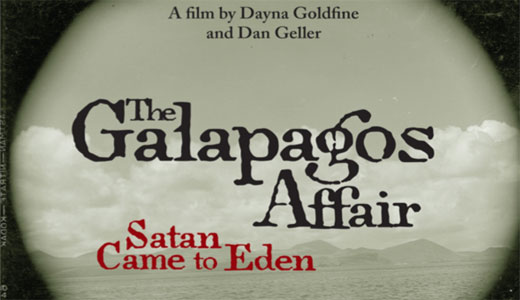
This documentary is “Exhibit A” for that old maxim, “Truth is stranger than fiction.” The atavistic impulse to “get away from it all,” leave the proverbial rat race, and “return to nature” has been a literary theme since Robinson Crusoe and the Swiss Family Robinson cast away on so-called “desert islands.” Archaeologist Thor Heyerdahl wrote the book Fatu-Hiva: Back to Nature about his attempt to live close to the land in the Marquesas Islands in the 1930s.
During that same decade, a few Europeans got the same notion, but instead of settling in the South Seas, like Heyerdahl, Herman Melville, Paul Gauguin, and Robert Louis Stevenson, they chose the Pacific archipelago off Ecuador’s coast.
As the title suggests, The Galapagos Affair, Satan Came To Eden is a chronicle of the best laid plans of mice and men going terribly wrong amidst the marine iguanas, tortoises, and other famous Galapagos wildlife. This doc is also a chronicle of human stupidity – if not madness – on a stupendous scale.
Veteran documentarians Dayna Goldfine and Dan Geller previously collaborated on nonfiction films about dancer Isadora Duncan and on the Ballets Russes. Affair‘s co-directors skillfully unravel the dramatic incidents that unfolded on Floreana, a remote, uninhabited isle in an already extremely remote archipelago, 80 years ago. Strangely, however, key points of reference to the Galapagos are never mentioned, including Melville’s stories called The Encantadas and Charles Darwin’s visit there aboard the Beagle in his quest to prove the theory of evolution.
The island chain of events began when Friedrich Ritter, a German doctor, and his Berliner lover and patient, Dore Strauch renounced civilization and its discontents and relocated to the far-flung Galapagos in 1929. A self-professed Nietzschean, Ritter eschewed being a physician in favor of being an “Übermensch” in a state of nature at Floreana, far from the madding crowd. But the Germanic “super” couple are unable to leave behind the baggage of themselves: Dore suffered from multiple sclerosis and needed frequent medical attention — not the backbreaking labor of life in the wilderness, which generated conflict between them. From time to time visitors sailed to the distant isles. Word got out about these “modern day Robinson Crusoes,” and to the outside world suffering from the Depression they became a celebrity Adam and Eve living a supposedly Edenic existence.
This inspired others to try to “return to nature” at Floreana, including a couple from Cologne, Margaret and Heinz Wittmer. Without even corresponding with Ritter first, the couple just showed up unannounced, she expecting not only a baby but Ritter to serve as her personal physician. Their uninvited presence and requirements infuriated the reclusive Ritter, who now was being imposed upon by total strangers, not only to help them to survive but to play doctor again – something he had tried to give up, but was obligated to do to help Dore.
Into this combustible mix next came the self-styled Baroness Eloise von Wagner and two German paramours. The eccentric Austrian woman began making a series of outrageous demands, combined with outlandish behavior, as she planned to build a resort at this remote outpost. All hell broke loose in what was supposed to be a heaven filled with iguanas, tortoises, penguins, exotic birds, and more. As the press notes aptly put it, it’s “Darwin meets Hitchcock.”
Goldfine and Geller adroitly use archival footage — much of it shot by a California moneybags yachtie who sailed to the Galapagos from time to time — and original interviews with island residents, some of them children and grandchildren of the real life tale’s protagonists, to relate this mysterious yarn with its age-old moral about being careful what you wish for: You just might get it – and then some. To give an idea how dire the circumstances became at this would-be paradise, Dore Strauch eventually deserted it, finding Nazi Germany preferable to her little utopia gone wrong. Providing Dore’s voice, Cate Blanchett incarnates a character even more pathetic than the one she scored an Oscar for portraying in Woody Allen’s 2013 Blue Jasmine.
In Genesis, there was a snake in Eden that resulted in Adam and Eve being expelled from paradise. In The Galapagos Affair, Satan Came To Eden, the characters’ expulsion is not from eating the apple from the Tree of Knowledge, but from eating the forbidden fruit of all-too-human folly.












Comments